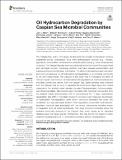Oil Hydrocarbon Degradation by Caspian Sea Microbial Communities
Author(s)
Miller, John I.; Techtmann, Stephen; Mahmoudi, Nagissa; Fortney, Julian; Joyner, Dominique; Liu, Jiang; Olesen, Scott; Alm, Eric J; Fernandez, Adolfo; Gardinali, Piero; GaraJayeva, Nargiz; Askerov, Faig S.; Hazen, Terry C.; ... Show more Show less
DownloadPublished version (6.850Mb)
Publisher with Creative Commons License
Publisher with Creative Commons License
Creative Commons Attribution
Terms of use
Metadata
Show full item recordAbstract
The Caspian Sea, which is the largest landlocked body of water on the planet, receives substantial annual hydrocarbon input from anthropogenic sources (e.g., industry, agriculture, oil exploration, and extraction) and natural sources (e.g., mud volcanoes and oil seeps). The Caspian Sea also receives substantial amounts of runoff from agricultural and municipal sources, containing nutrients that have caused eutrophication and subsequent hypoxia in the deep, cold waters. The effect of decreasing oxygen saturation and cold temperatures on oil hydrocarbon biodegradation by a microbial community is not well characterized. The purpose of this study was to investigate the effect of oxic and anoxic conditions on oil hydrocarbon biodegradation at cold temperatures by microbial communities derived from the Caspian Sea. Water samples were collected from the Caspian Sea for study in experimental microcosms. Major taxonomic orders observed in the ambient water samples included Flavobacteriales, Actinomycetales, and Oceanospirillales. Microcosms were inoculated with microbial communities from the deepest waters and amended with oil hydrocarbons for 17 days. Hydrocarbon degradation and shifts in microbial community structure were measured. Surprisingly, oil hydrocarbon biodegradation under anoxic conditions exceeded that under oxic conditions; this was particularly evident in the degradation of aromatic hydrocarbons. Important microbial taxa associated with the anoxic microcosms included known oil degraders such as Oceanospirillaceae. This study provides knowledge about the ambient community structure of the Caspian Sea, which serves as an important reference point for future studies. Furthermore, this may be the first report in which anaerobic biodegradation of oil hydrocarbons exceeds aerobic biodegradation.
Date issued
2019-05Department
Massachusetts Institute of Technology. Department of Civil and Environmental EngineeringJournal
Frontiers in Microbiology
Publisher
Frontiers Media
Citation
Miller, John I. et al. "Oil Hydrocarbon Degradation by Caspian Sea Microbial Communities." Frontiers in Microbiology 10 (May 2019): 995 © 2019 Frontiers Media
Version: Final published version
ISSN
1664-302X